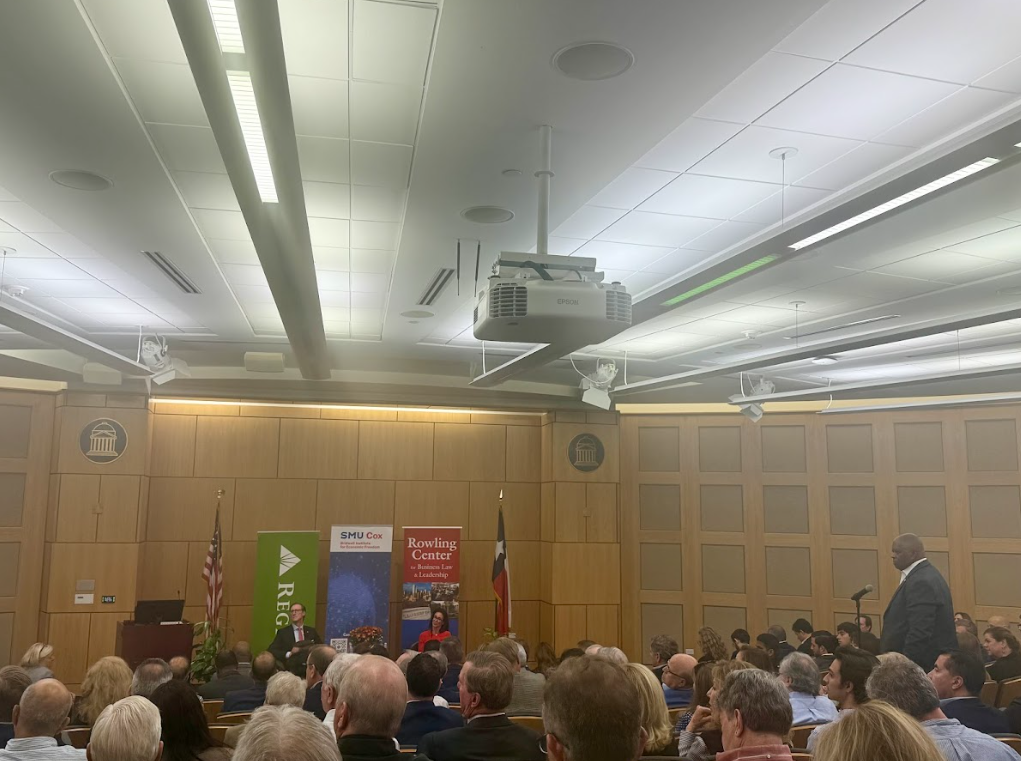DALLAS, Texas – Hundreds gathered at Southern Methodist University for an interview with Nicole Chambers, the Texas Stock Exchange’s (TXSE) new Global Manager Director of Listings, who offered insight into the barriers businesses entering the public U.S. equity markets face and how TXSE plans to address them.
The Oct. 15 event, “From the Stockyards to the Stock Market: A Discussion about the Texas Stock Exchange” also served as a public forum to answer questions from local residents about the new stock exchange expected to begin trading in the first quarter of 2026 headquartered in Dallas.
TXSE’s mission is to challenge the New York Stock Exchange (NYSE) and Nasdaq duopoly by “reduc[ing] cost of being public by removing the red tape and allow[ing] companies to make a choice between private and public that is the same opportunity cost,” Chambers said.
Just weeks prior, the United States Securities and Exchange Commission (SEC) approved TXSE as a national securities exchange, marking the first stock exchange to be headquartered in Texas. It will operate as a national securities exchange with automated trading platforms similar to the Nasdaq and NYSE. But unlike the regional stock exchanges in Philadelphia, Boston, and Chicago, which were acquired, TXSE aims to be a third formidable national exchange player.
The SEC approval follows TXSE raising almost $225 million to date from institutional investors and high-profile private wealth such as BlackRock, Citadel Securities, and the family office of Michael Dell, founder of Dell Technologies.
Interest in launching an additional national securities exchange follows the push for Texas to be recognized as a finance powerhouse, amplified by a significant migration of businesses and people to the state.
Texas would be the eighth-largest economy in the world in terms of Gross Domestic Product (GDP) if the state was a country, said Chambers while in discussion with moderator, Chief Investment Officer of Regions Bank Alan McKnight. The auditorium inside Collins Executive Education Center was packed.
Despite optimism around TXSE’s launch, the broader initial public offering (IPO) market has been spotty with an approximate 45% decrease since the mid-1990s. Chambers said fewer companies are seeking or maintaining public status due to the expensive nature of going public.
Drivers of the high fees of operating as a public company include regulatory requirements, legal and administrative expenses, and time-consuming procedures. Chambers said, “a lot can be blamed on the exchanges (Nasdaq and NYSE) overreaching as a regulator.”
The under-utilized public markets result in companies opting to “stay private for a very long time to the point that when they do go public, they’re very large, and it takes away from the opportunity for retail investors to get involved,” she said.
Jim Tolbert, founder of Mexus Advisory Services, a cross-border mergers & acquisitions advisory firm, attended the event with hopes to gain deeper insight into the TXSE.
“When I heard about this opportunity, [I] thought there would be interest with my clients because of the obvious geographic and cultural fit between Mexico and Texas, and the need for [Mexican public companies] to find liquidity,” Tolbert said.
Other audience members believe the TXSE could bring second derivative benefits beyond just the publicly listed companies. Devin Jansen, a Dallas-based IT recruiter, believes the TXSE can positively impact her business.
“The backbone of every company is IT. So, for my industry, this is good news,” Jansen said.
Still, there is uncertainty surrounding the future of TXSE.
“We’ve seen a lot of failed exchanges… we’ve seen several exchanges attempt to come to the market and not thrive,” Chambers said.
She attributed many of those failures to an overemphasis on prioritizing ultra-fast trading models representative of the “Flash Boys” era over recruiting corporate listings. Chambers was referring to Michael Lewis’ Flash Boys, a book that drew attention to the consequences of high-frequency trading following the 2008 financial crisis.
TXSE intends to differentiate itself by focusing on attracting companies to go public or dual-list on multiple exchanges. With that goal, TXSE may experience potential issuer and investor hesitancy to participate in a start up exchange. However, TXSE is bound by the Sarbanes-Oxley Act of 2002, a federal law aimed to improve corporate financial disclosures, and companies listed on TXSE will need to comply. Businesses joining the TXSE would be subject to the same regulations and costs as companies on more established exchanges.


